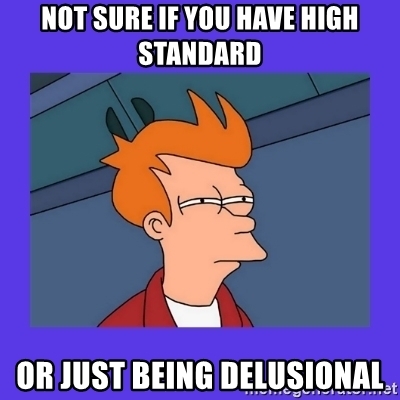By Maurizio Bisogno
What does being delusional really mean? “Totally delusional.” Why would you say that? I don’t believe I can do what I falsely believe I can do.
Usually we understand delusion on its negative side: my aim here is to show that instead of having the form of believing, delusion can happen as not-believing. We think of delusional as a positive belief which is not grounded in reality, one believes too much of himself or one doesn’t see the situation for what it is, i.e. much less flattering than he believes it is. But one can also be delusional in relation to a negative belief about himself or a context. It is possible to be negatively delusional, as when we are not seeing what we are capable of, i.e. we underestimate ourselves or we don’t see the opportunities which could arise from a situation, we do not see the great possibilities of a situation. So, delusional refers to both a positive or a negative false belief about ourselves and – or about a context.
We should ask now: Where does the delusion come from? Why aren’t we able to see ourselves for what we are? This is related to pain. In fact delusion happens either because we wish to avoid pain or because we are looking for pain (self-inflicted, punishment, etc.).
So let’s repeat that:
a. we intend to avoid painful feelings deriving from what we are
b. we aim at inflict pain to ourselves for what we are.
As you can see, the common denominator is: what we are.
Let’s see some practical situations: for instance we are actually, measurably not so good at something and we believe we are very good at that same thing; or, we are actually/measurably good at something and we believe we are not so good at it as we need to keep ourselves below a certain level of contentment, we are not allowing ourselves to be happy about ourselves. In both cases we are delusional. It is a defense mechanism.
If we have this need of protection, we can legitimately ask: Who or what is threatening us? Once again, the answer is quite a simple word: Pain, especially emotional and mental pain. We fear the insurgence of those painful emotions attached to thoughts and deeds. It happens as the barrier against them is taking the form of a need, it is perceived as an uncontrolled desire to have one or more thoughts expressing positive, good, admirable things about ourselves – especially if they are not true. We think about ourselves, we have consciousness of what we are, we are self-aware, we look at ourselves in the mirror – and then we produce a thought about what we see, an evaluative thought, we judge ourselves, usually we hear someone else’s voice, not literally, but we think of what someone else would say about us, we adopt someone else’s point of view. This could be what your parents, or what a friend, or a teacher, or an older person would say… we adopt the point of view of someone who we consider apt to judge, to evaluate: we are still minors! We think that we are not capable of having a reliable opinion about ourselves without the help of those «authorities». We are incapable of doing it ourselves. It is less painful to follow the external authority. They tell us that if we do “so and so” we will end up “so and so”. If we listen we avoid the pain of learning by experience, which generally means that we will avoid physical and emotional pain.
But by proceeding in this way, we will not build up something very important to us as adult human being, a specific tool: the ability to evaluate correctly our thoughts, our believes and our actions. We will always depend on someone else’s opinion, we delegate to someone else the ability to think, to choose… to live. We ultimately give away a great part of our life. We are not capable of seeing things and ourselves for what they are and therefore we are always delusional unless we listen to an external mind, to the voice which is not ours, because we don’t trust ourselves, our own voice. We crave for control. We end up living someone else life as we are not capable of judging by ourselves neither the material conditions we are in, neither what we can and should do, we are not capable of acting in our best interest.
We started this communication by saying that we are delusional, now we know that to eliminate this trait from our personality we are required to take full responsibility for who and what we are; we must grow that main organ which is typical of an adult: the ability to judge by ourselves, as the age of “majority” comes with the full development of this faculty of ours. In the next article we will see how this does not mean the elimination of established knowledge and of interacting with other people ideas. Have a nice day.
Next: Courage to be yourself, to accept your being different as in non-politically correct.
